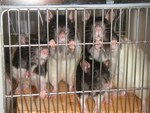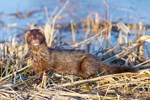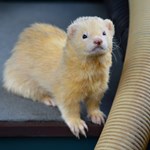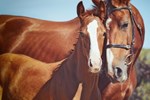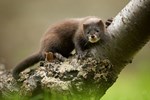Dr Maria Diez Leon
Department: Pathobiology & Population Sciences
Campus: Hawkshead
Research Groups: Animal Welfare Science and Ethics, Brain Health and Behaviour, CPCS (Research Programme)
Research Centres: RVC Animal Welfare Science and Ethics
Senior Lecturer (eq. Associate Professor) in Animal Welfare
María is a zoologist specialising in animal behaviour and welfare. She graduated in Biology at the University of Navarra. She went on to pursue an MSc in Applied Animal Behaviour and Animal Welfare at the University of Edinburgh, conducting her project in collaboration with Aarhus University. Bitten by the research bug (her research subjects - mink - would eventually bite her as well), she embarked on a PhD at the University of Guelph. Under the supervision of Professor Georgia Mason, she investigated how housing conditions affect carnivore behaviour and brain function and the potential implications of this for conservation breeding programmes. Her postdoctoral work addressed how cage size per se affects the welfare of farmed mink. Since arriving as faculty at the RVC, she is working on increasing our understanding of behavioural and physiological indicators of animal welfare, and investigating how constrains of captivity impact the success of conservation translocations.
María's love for languages also saw her graduating as a translator and interpreter from the University of the Basque Country. During her time as a postdoctoral fellow at the University of Guelph, she undertook training in teaching in Higher Education, and at the RVC she obtained a PG Cert in the same field.
My group's research is focused on understanding the relative importance of early vs. current environment on adult animal behaviour, with particular emphasis on behavioural flexibility and development of social and cognitive skills in captivity, as key to ensure optimal welfare and performance. We apply this knowledge to, for example, tackle abnormal behaviour in individuals under human management, and improve reproductive and reintroduction success in conservation breeding programmes. We work both on species of conservation interest, as well as domesticated species. Here are some of our current projects:
Understanding causes of abnormal reproductive behaviour in the critically endangered European mink (Mustela lutreola) (partially funded by the Estonian Research Council)
Captive-born European mink males miss out on mating opportunities with receptive females, either ignoring or attacking them, jeopardizing conservation breeding efforts. Our goal is to understand the causal basis underpinning this seemingly malfunctional behaviour - and welfare-related factors in particular - to devise practical ways to improve breeding performance and reintroduction success. Partners: Species Conservation Lab in Tallinn Zoological Gardens, Foundation for Research in Ethology and Biodiversity.
Maternal influences in the development of abnormal oral repetitive behaviour and its precursors in foals (Equus caballus) (partially funded by the RVC Internal Equine Fund)
In horses, abnormal oral repetitive behaviours such as crib biting raise welfare concerns and can affect foal trainability and value. We are working to understand how maternal characteristics - from behaviour to gut microbiome and personality - influence the development of crib-biting and its precursors in foals in order to develop early interventions to tackle these behaviours.
Welfare and reproductive success in zoo-housed Pallas's cats (Otocolobus manul) (partly funded by UFAW)
Surprisingly for a naturally wide-ranging carnivore, Pallas's cats in zoos have not been reported to perform abnormal repetitive behaviours such as pacing, yet their high susceptibility to toxoplasmosis and elevated infant mortality raise concerns about their welfare. We are working with EAZA and AZA to devise evidence-based guidelines to raise the standards of care for these felines.
Current group members: postdoctoral fellow Dr. Kairi Kiik, and PhD students Aline Bouquet and Andrea Marín Sierra. Contact me if you're interested in joining our research team!
In addition, we are involved in the following projects led by our collaborators:
Long-term effects of the early environment for mink kit performance, stress responsiveness and welfare (led by Dr. Rebecca Meagher at Dalhousie University, Canada, and funded by MITACS).
Selected peer reviewed publications and book chapters:
Malmkvist, J., Díez-León, M., Christensen, JW. 2024. Animals with various forms of abnormal behaviour differ in learning: evidence from farm mink. Applied Animal Behaviour Science 124
Clark, G., Díez-León, M., Meagher, R. 2023. Diversity and novelty in environmental enrichment increases enrichment use in juvenile American mink (Neogale vison). Frontiers in Animal Science: 4:1228533.
Dancer, A., Díez-León, M., Bizley, J., Burn, C. 2022. Pet owner perception of ferret boredom and consequences for housing, husbandry, and environmental enrichment. Animals 12: 3262.
Dancer, A., Díez-León, M., Bizley, J., Burn, C. 2022. Housing and environmental enrichment of the domestic ferret: a multi-sector survey. Animals 12, 1065.
Crawford, A., Hildyard, J., Weaver-Ennis, C., Wells, D., Díez-León, M., Piercy, R. 2022. Validation of DE50-MD dogs as a model for the brain phenotype of Duchenne muscular dystrophy. Disease Models and Mechanisms 15: dmm049291.
Lezana, L., Hernández-Soto, R., Díez-León, M., Ríos, M., Baquero, E., Galicia, D. 2022. The effect of early experiences in barn owl (Tyto alba) behaviour. Acquisition-expression time of neophobia and filial imprinting. Implications for management and conservation. Behavioural Processes 195: 104569.
Harrington, L., Díez-León, M., Gómez, A., Harrington, A., Macdonald, D., Maran, T., Põdra, M., Sugoto, R. 2021. American mink might pose a COVID threat. Frontiers in Ecology and the Environment 19: 266-267.
Polanco, A., Ahloy-Dallaire, J., Díez-León, M. 2021. Abnormal behavior. In: Sørensen, D.B., Gaskill, B. Animal-centric Care and Management - Enhancing Refinement in Biomedical Research”. Taylor and Francis, UK.
Díez-León, M., Kitchenham, L., Duprey, R., Bailey, C., Choleris, E., Lewis, M., Mason, G. 2019. Neurophysiological correlates of two types of stereotypic behaviour in male American mink (Neovison vison). Behavioural Brain Research 373: 11205.
Martin-Wintle, M., Wintle, N. Díez-León, M., Swaisgood, R., Asa, C. 2019. Improving the sustainability of captive populations with free mate choice. Invited submission to Zoo Biology: Special Issue: "Sustainability of AZA managed populations". Zoo Biology 38: 119-132.
Polanco, A., Díez-León, M., Mason, G. 2018. Stereotypic behaviours are heterogenous in their triggers and treatments in the American mink, Neovison vison, a model carnivore. Animal Behaviour 141: 105-114
Polanco, A., Campbell, D., Díez-León, M., & Mason, G. 2017. Towards a taxonomy of stereotypic behaviours in the American mink (Neovison vison): Homogeneous or heterogeneous?. Applied Animal Behaviour Science: 194: 95-103
Díez-León, M., Quinton, M., Mason, G. 2017. Preference for cage height in a model organism, the American mink (Neovison vison). Applied Animal Behaviour Science 192: 24-34
Díez-León, M., Bursian, S., Napolitano, A., Palme, R., Galicia, D., Mason, G. 2016. Environmentally enriching American mink (Neovison vison) increases lymphoid organ weight and skeletal symmetry, and reveals differences between two sub-types of stereotypic behaviour. Applied Animal Behaviour 177: 59-69
Díez-León, M., Mason, G. 2016. Effects of environmental enrichment on aspects of maternal behavior, and infant growth and mortality, in American mink (Neovison vison). Zoo biology 35:19-28
Díez-León, M., Miranda, R., Ariño, A. H., Galicia, D. 2015. Setting priorities for existing conservation needs of crayfish and mink. Conservation Biology 29: 599-601
Meagher, R., Dallaire, J., Campbell, D., Buob, M., Hansen, S., Díez-León, M., Palme, R., Mason, G. 2014. Benefits of a ball and chain: simple environmental enrichments improve welfare and reproductive success in farmed American mink (Neovison vison). PLOS ONE 9: e110589
Walker, M., Díez-León, M., Mason, G. 2014. Animal welfare science: recent publication trends and future research priorities. International Journal of Comparative Psychology 27:80-100
Díez-León, M., Bowman, J., Bursian, S., Filion, H., Galicia, D., Kanefsky, J., Napolitano, A., Palme, R., Schulte-Hostedde, A., Scribner, K., Mason, G. 2013. Captive rearing environments that induce stereotypies compromise copulatory performance in a model carnivore, the American mink (Neovison vison). PLoS ONE 8: e80494
Meagher, R. K., Bechard, A., Palme, R., Díez-León, M., Hunter, B., Mason, G. 2013. Sleeping tight or hiding in fright? The welfare implications of different subtypes of inactivity in mink. Applied Animal Behaviour Science 144: 138-146
Meagher, R. K., Bechard, A., Palme, R., Díez-León, M., Hunter, B., Mason, G. 2012. Decreased litter size in inactive female mink (Neovison vison): mechanisms and implications for overall productivity. Canadian Journal of Animal Science 92: 131-141
Dallaire, J., Meagher, R. K., Díez-León, M., Garner, J. P. & Mason, G. J. 2011. Recurrent perseveration correlates with abnormal repetitive locomotion in adult mink but is not reduced by environmental enrichment. Behavioural Brain Research 224: 213-222
María is the RVC course director for the MSc in Wild Animal Biology, and the MSc in Wild Animal Health, where she also teaches in the Wild Animal Health and Conservation Interventions, and the Health and Welfare of Captive Wild Animals modules. She also leads and teaches in the final year module on Animal Behaviour and Cognition in the BSc in Animal Biology, Behaviour, Welfare and Ethics, where she also teaches in the Science of Animal Welfare, and Applied Animal Welfare modules. She regularly supervises BSc, BVetMed, MSci and MSc research projects, both at the RVC and in collaboration with other institutions.
-
Assessing and Improving Animal Welfare
Genetics and management can greatly affect the welfare of farm, laboratory, companion and wild animals. We aim to improve animal welfare by understanding how human activities and management practices affect the welfare of animals that are kept, killed or otherwise impacted by humans. Comparative research can identify practices that generally elicit poor or good welfare outcomes, providing evidence that can be used to support initiatives to improve animal welfare.
-
Empirical assessment of welfare in wild American mink and Eurasian otters: the effects of intra- and inter-specific population density
Scientific and societal interest in the welfare of free living wild animals is increasing, but it's study remains methodologically challenging, particularly for species that are harder to observe during daytime, such as carnivore species. The aim of this project is to provide insight into variation in welfare in response to changes in intra- and inter-specific population density (two potential stressors) using American mink and Eurasian otters in the UK as a model system.
-
Fundamental understanding of welfare
Animal welfare refers to animal feelings, health, and environmental suitability. These projects explore which animals are sentient and what feelings they have, and how behaviour, health, environments, and welfare interrelate. We use a wide range of techniques to investigate these fundamental questions, each of which is tailored to the particular hypothesis and species involved. Emotions are subjective (private) to the individual experiencing them, which makes them challenging to investigate scientifically.
-
Implications of mare life history and mare-foal attachment for mare welfare at weaning - a pilot study
While the welfare effects of weaning are well documented for foals and young from many species, the impact on mares are understudied. Here, we look at whether mare life history (e.g. number of previous foals) and degree of attachment to their foals help explain the varying responses of mares when they are separated from their foals, in order to improve their welfare at weaning
-
Improving the welfare of translocated individuals: European mink as a case study
Animal welfare can be compromised during conservation translocations, jeopardising efforts to restore biodiversity. This project investigates how improving welfare can positively impact reintroduction success in the critically endangered European mink.

